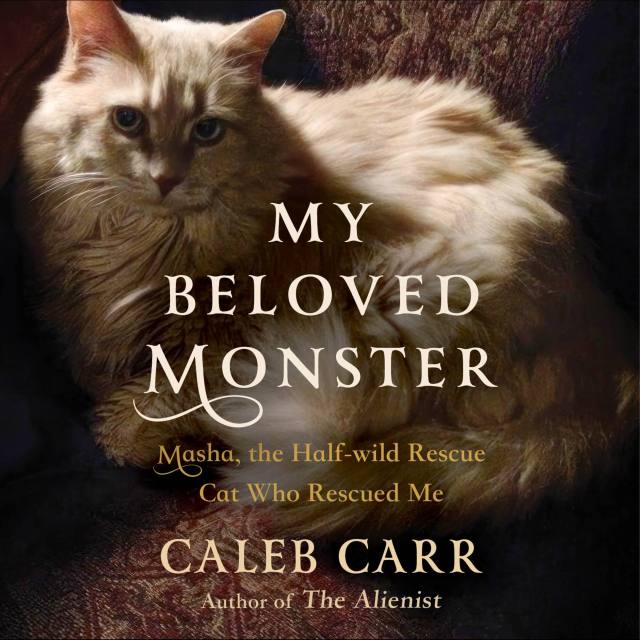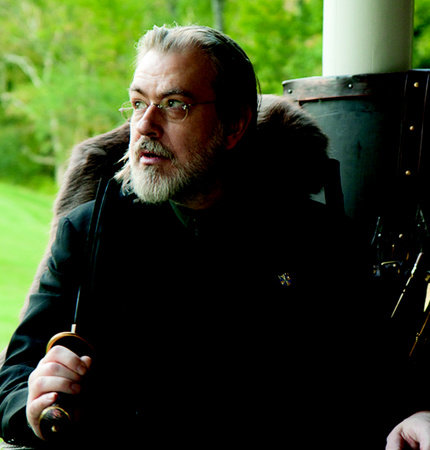
(Caleb Carr considered his late cat Masha, the subject of his new book, the love of his life.)
Over the years I have enjoyed Caleb Carr’s historical fiction immensely. THE ALIENIST, THE ANGEL OF DARKNESS, and SURRENDER reflect his commitment to his craft integrating an accurate approach to history and exceptional character development. His latest book is a total change from what he has written previously. MY BELOVED MONSTER: MASHA, THE HALF-WILD RESCUE CAT WHO RESCUED ME maintains his superb writing and as far as character development it continues in his latest work, this time with a feline. Being a cat lover myself, having had deep relations with the feline species over the years, including KC who was with me and my family for over nineteen years, and our current duo of Kota and Shelby who we rescued over ten years ago, I greatly enjoyed Carr’s dual biography of Masha and Caleb. I have learned a great deal about Carr’s life and views on society, which makes his historical novels more interesting. But, from a cat person’s viewpoint I learned a great deal about felines through Masha’s life story, both about Masha and my own cats.
Carr’s recounting of his relationship with Masha is presented on a number of levels. First, it provides insights into how humans and felines bonded. I can relate to a great deal of what Carr recounts, but he adds a dimension I have never thought off – how a cat’s neurological, heredity, and species development impacts their choice of whom to bond with and try to manipulate. Second, if you are a cat person you realize early on that they control you, not the other way around. As Carr explains they are able to get you to do what they want easily, but once you gain their trust you can impact their behavior as opposed to controlling it. Third, Carr’s ability to decode much of Masha’s inner world.
In a sense Carr has written a love story that is like no other. He describes how each participant in the relationship projects their needs and how they are met. Carr and Masha had been together for seventeen years and most of the time they were inseparable. Masha is a Siberian Forest cat which presents its own issues that domesticated cats do not present. Carr adopted her after her previous owner locked her in an apartment. When they met, a cat’s intuition was on full display as somehow she knew that Carr was a perfect match, especially when she was taken home to a three story home in rural upstate New York. She would have the best of two worlds; outside where her instincts could be tested; and inside where she could control her environment and also her relationship with Carr.

Masha had to be special as she replaced Suki, Carr’s previous cat who he also had a strong relationship with. According to Carr cats are independent and are never responsive to punishment or negative reinforcement as forms of discipline and training. They do not need us, but rather make use of us. “Their loyalty depended on mutual respect and decent treatment.” Carr carefully relates how his own life, in part, paralleled that of Masha. At a very early age he drifted away from people and forged his closest bonds with cats. As a boy he believed he had been a cat in a previous life and wanted to return to that life. He grew up with an abusive father with two alcoholic parents who were somewhat violent. Carr feared his father would kill him and he evolved into a very angry person. He would turn to cats for compassion. Cats taught him how “to give and receive not simply a talent for survival but compassion, affection, love, and joy.” As the two of them bonded over the years Carr expressed surprise at their shared childhood traumas, shared physical ailments that included arthritis, neuropathy probably caused by the physical violence of their younger years. For Carr illness added a new intensity to his connection with Masha as he wondered if he would outlive his companion. When Carr was ill he returned to Masha who like many cats knew exactly how to care for her friend.
The number of astute observations Carr makes is astounding. Among the many that I can relate to are cats usually bond with just one human, not several, no matter how well socialized they might be – I have witnessed this firsthand as my wife Ronni and I share two cats, Kota and Shelby. Interestingly, Kota gravitates to me and would spend her entire day, sleeping, playing, and just keeping me company. Shelby is attached to Ronni and is content to stay on the right side of our bed where Ronni sleeps, and Kota dominates the left side with me – in fact, we had to buy a king size bed to accommodate all four of us! Many cat owners believe that cats stick around so long as food is available and that cats are aloof, at times, finicky. In fact, what they want is attention, interaction, and play – and if they do not receive it they can become lethargic and obese as food becomes their only option.
As Chris Bohjalian writes in his Washington Post review “what makes the book so moving is that it is not merely the saga of a great cat. Libraries are filled with books like that, some better than others. It’s the 17-year chronicle of Carr and Masha aging together, and the bond they forged in decline. (As Philip Roth observed, “Old age isn’t a battle; old age is a massacre.”) He chronicles their lives, beginning with the moment the animal shelter begs Carr to bring the young lioness home because the creature is so ferocious she unnerves the staff — “You have to take that cat!” one implores.”* Through the struggles that life presents all of us from illness, happiness, and sadness.
Trust is the key in any relationship and cats are no exception, but the trust level between Carr and Masha reaches an incredible level. Whether Carr is discussing his own health history or that of his feline companion their synergy amazes. How they support each other is nothing less than extremely unusual, but if you are a cat owner and have had an injury or an illness you have experienced the sensation of being cared for by your furry friend. I can speak to this from knee to hernia surgeries or my wife’s knee replacements – there is always a cat present to cheer one up, indirectly lessening one’s pain.
For all of Carr’s insights into Masha’s behavior there is one area I would question – her language skills. Carr goes a little overboard when discussing his verbal interactions with Masha, particularly the idea that she is sounding out words. I do believe cats do understand a series of words, but to go as far as a conversation between a human and a feline I have my doubts. In the end Carr has authored a marvelous book delving into his lifelong relationship with cats and focusing on Masha in particular. Carr has written a love story which can only bring a smile and tears to the reader.
*Chris Bohjalian. “Libraries are full of books about great cats. This one is special.” Washington Post , April 13, 2024.
To learn more about Caleb Carr and his latest book check out the following article from the Los Angeles Times:
‘Alienist’ author Caleb Carr — grieving his late cat — reflects on his life amid battle with cancer
Caleb Carr considered his late cat Masha, the subject of his new book, the love of his life.
By Chris Vognar
April 15, 2024 3 AM PT
My Beloved Monster: Masha, the Half-wild Rescue Cat Who Rescued Me
By Caleb Carr
Little, Brown: 352 pages, $32
Caleb Carr visits the grave of his beloved Masha, whom he considers the love of his life, every day. “We have a little chat,” said Carr, best known for his 1994 crime novel “The Alienist,” during a video call from his home in upstate New York. It’s late at night — Carr is a longtime night owl who does most of his work after it gets dark — and the author, who now has a long white beard, is thinking about grief and dying — subjects that linger over his new nonfiction book, “My Beloved Monster,” and loom over what might be the final months of his life.
Masha, the beloved monster, was a Siberian forest cat whom Carr rescued from a shelter and built a life with in his mountainside home in Cherry Plain, N.Y. Animals, particularly cats, had long been a source of companionship and comfort for Carr, an antidote of sorts to a chaotic, abusive childhood in New York’s Lower East Side. As Carr writes in the new book, his father, the Beat poet, journalist and convicted manslaughterer Lucien Carr, had a habit of knocking his son down flights of stairs. “I began to understand that he was trying to kill me,” Carr writes. “And while I didn’t yet know about his past” — Lucien Carr stabbed David Kammerer to death in 1944, later claiming that Kammerer came on to him sexually and offering a “gay panic” defense — “I certainly recognized, from the horrifying and even gleeful expressions that would enter his face when he came after me, that he was capable of killing.”
“I have been living with the idea of death since I was a small kid because my father taught me about it,” he said. But death has become much more than an idea of late. Carr, 68, has cancer, which started in his prostate and has spread throughout his body.
“If I could be around when the book is published, that would be really nice,” he said in late January. “I don’t know what’s going to happen when, but it’s not going to be good. I always knew cancer moved fast, but boy, when it starts to move, it starts to eat you. Madness. Just madness.” “My Beloved Monster” will be released on Tuesday.
It was Masha’s death on April 5, 2022, and Carr’s subsequent despondence, that led him to write “My Beloved Monster,” which reads as a love story, a tribute and a reminder that, in some instances, the uncomplicated love of animals helps humans keep going.
A blond, long-haired beauty with a wild side who had been rescued from a cat hoarder, Masha initially greeted Carr, as he writes, with “one of the most communicative gazes I’d ever seen in a cat, a look facilitated by the structure of her face: the eyes were oriented fully forward, like a big cat’s rather than a domestic’s, and seemed to comprehend everything she was studying — especially me — only too well.” Carr writes about cats with a tender vividness that might make you see your own pets through new eyes.
As a child Carr lived in an environment where people couldn’t be trusted, with wild parties and everyday life descending into violence. He lived in a neighborhood so rife with drugs and prostitution that it provided the shooting location for the climax of Martin Scorsese’s “Taxi Driver.” But he always had animals: dogs, gerbils, fish, rabbits and, most to the young Carr’s liking, cats. The family cats would join him in cowering from the domestic turmoil, and comfort him as he reeled from another beating. They seemed to understand him.
Carr would go on to a career as a military historian, journalist and novelist, reaching a wide audience with “The Alienist” (and its 1997 follow-up, “The Angel of Darkness”). The books put his darkness into words as he told the story of a late 19th century forensic psychiatrist on the trail of a serial killer. But he never really forgot his four-legged friends. When he met Masha, he quickly realized he had found a soulmate.
“Animals fulfill something that was damaged in all of us when we were very young and can’t be fixed by people,” Carr said. “We can go on to have relationships with people, but those wounds need a different kind of treatment than people can provide, and that causes trouble when you have to explain that very carefully to whatever girlfriend or whatever significant other you have. I never lasted as long with a woman as I did with Masha, God knows, and no woman ever did for me what she did, which sounds crazy even to me. But it’s really true.”
Carr was actually contracted to write another “Alienist” book, but the spirit did not move him. He was deep in grief and needed to get it onto the page. He began cranking out the story of his life with Masha and sent a draft to his editor, Bruce Nichols, who was also the publisher of Little, Brown before he stepped down in March. Nichols was on board with Carr’s change in direction from serial killing to cat love.
“It was clearly a passion project for him, not only because of his medical situation but because he spent his whole life with cats and this one was very special to him,” Nichols said. “If you’re a cat lover and owner, or a dog person, I think it will resonate with you. And I don’t think it matters whether you care about historical fiction or military history or any of Caleb’s past experiences. It’s sui generis. It is what it is, and it’s an amazing book.”
Carr certainly hopes to tap into the pet community (and perhaps see if any “Alienist” fans are Catster subscribers). He also hopes to win over skeptics who might doubt whether one can love and grieve a beloved animal with the intensity usually reserved for another human.
“I’m hoping that some people will learn from this, and maybe even catch themselves almost thinking of Masha as a person,” Carr said. “That’s really what we have to do as a society much more: Think of these animals as our equals. That’s what they are.”

(Author, Caleb Carr)

Nice. Have you read it yet? It sounds amazing. If I was home full time Imwould get a c